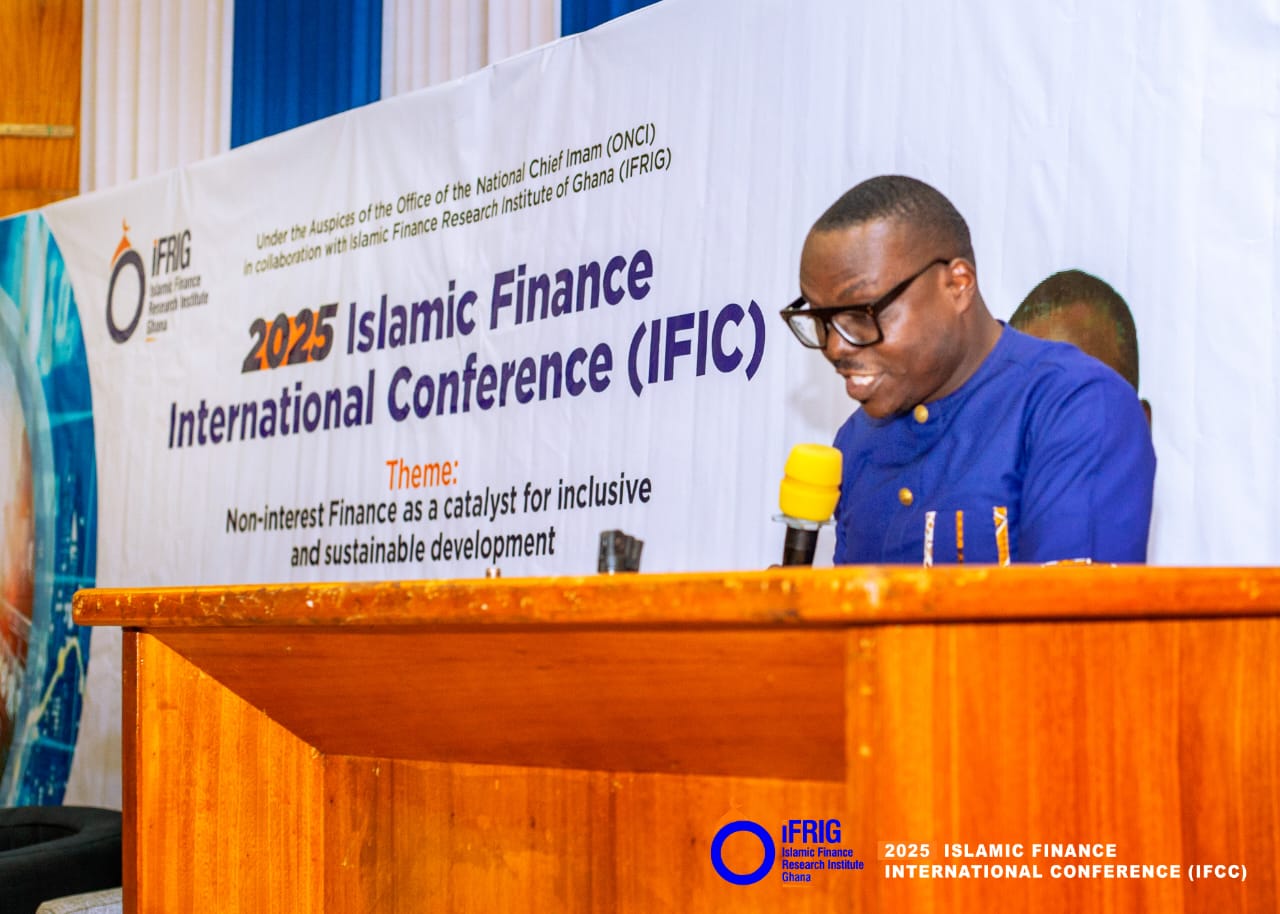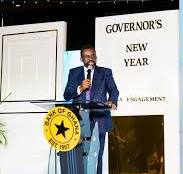Call for Action Echoed…. As 4th Int’l IF Confab ends in Accra
By: Mohammed A. Abu
The 4th Islamic finance International Conference, organized under the auspices of the Office of the National Chief Imam in collaboration with the Islamic Finance Research Institute of Ghana(IFRIG) ended in the country’s capital, Accra, over the weekend with a call to action.
Held under the theme, “Non-Interest Finance as a catalyst for inclusive and Sustainable Development”, the one-day event attracted regulatory institutions, private sector players, diverse religious groups, women groups, professional bodies, investment agencies among others.
In his welcome address, Dr. Shaibu Ali, Director General of IFRIG, emphasized that, passing regulations is only the beginning, adding, “The real task lies in building credibility, capacity, and trust”.
This means, Dr. Ali noted, equipping financial institutions with skilled professionals, ensuring transparency in practice, developing capital market instruments like Sukuk (non Interest Bonds), and collaborating with global partners.
IFRIG, he assured, remains committed to supporting regulators, financial institutions, and industry players with cutting-edge research, training, and policy guidance to ensure that when Ghana finally launches its non-interest finance sector, it will be competitive, resilient, and inclusive.
The conference, he noted, is not only a forum for discussion but a call to action. “Together, we have the opportunity to create a financial ecosystem that reflects Ghana’s diversity, meets the needs of businesses and communities, strengthens our international financial standing, and positions our country as a credible participant in the global non-interest finance movement. Let us embrace this moment with vision, collaboration, and determination”.
Dr. George Baah-Danquah, a treasury and investment banker, accounting and finance professional stood in the stead of the President of the Catholic Bishops Conference of Ghana, the Chairman for the occasion.
In his acceptance speech, he noted that, the event brought together an impressive gathering of expertise, vision, and conviction—men and women who believe that finance, when guided by values, can serve as a tool for justice, inclusivity, and national development.
The theme for this conference, “Non-Interest Finance as a Catalyst for Inclusive Growth and National Development,” Dr. Baah-Danquah said was timely and significant
In some jurisdictions, Dr. Baah Danquah intimated, religious differences amongst Christians Muslims and other faiths are often emphasized in ways that foster division and, sadly, conflict.
In Ghana, however, he underscored, we have built on our commonalities, discovering in them the foundations of peace, unity, and collaboration. This harmony is one of our greatest national strengths and must be protected and deepened.
“As we turn our attention to the subject of non-interest finance, it is worth acknowledging its shared spiritual roots. The Bible warns against exploiting the vulnerable through unjust financial practices. While this concept finds resonance in Christianity, it is Islam that has given it a structured, institutional form that now inspires global financial systems.
“Today, we are invited to reflect on how non-interest finance can be practically harnessed—not only as an alternative to conventional finance, but as a genuine catalyst for inclusive growth. If applied well, it has the potential to broaden access to credit, empower small businesses, uplift rural communities, and advance our national development agenda.
“I look forward to the rich discussions and diverse perspectives that will emerge from this conference. May our deliberations not only broaden our intellectual horizons but also strengthen our shared commitment to building a financial system that places people and justice at its heart”
In a Keynote address by Dr. Johnson Pandit Asiamah, the Governor of Ghana’s Central Bank (Bank of Ghana) read on his behalf by one of his advisors, Franklin Belnye, he disclosed that the country’s introduction of non-interest financing project is progressing strictly as scheduled, guided by a methodical and inclusive approach.
Efforts he said, are proceeding on two parallel tracks, namely, stakeholder engagement and technical drafting.
Stakeholder Engagement
Stakeholder engagement is advancing steadily. The bank, he said, recognizes that building understanding and trust, is as important as drafting rules. Against this backdrop, the team has already conducted structured training for Journalists from across the country, equipping them with the fundamentals of non-interest financing to ensure accurate public discourse.
Furthermore, the bank has proactively consulted with diverse range of religious groups to clearly articulate the business and economic rationale for the framework ensuring it is seen as a national development tool rather than a niche religious offering.
The Technical Draft Itself
Earlier this month, he disclosed, the Technical Team completed the ‘zero-draft’ of the first set of Guidelines for non-interest financing. This critical milestone sets the stage for the next phase: A rigorous quality assurance process. The document is now progressing through the various stages of the bank’s standardized internal procedures following a full cycle of comprehensive policy and technical reviews, a preliminary exposure draft is to be published for public consultation. The bank eagerly anticipates the insightful feedback that would undoubtedly come from experts.
The cornerstone of the bank, is to build a robust and seamless financial system. To mitigate any risk of regulatory arbitrage and ensure stability, the bank is engaged with extensive collaboration with its fellow regulators-specifically, the National Insurance Commission(NIC) and the Securities and Exchange Commission(SEC).
The Bank together with SIC and SEC are developing harmonized and interoperable guidelines for non-interest insurance(Takaful) and capital market products(Sukuk). This holistic approach, is non-negotiable for creating a thriving NIBF ecosystem.
The Structure of the Future Industry
The framework will explicitly allow for two entry models: Non-Interest banking windows within conventional banks and fully fledged non-interest banks. The dual approach is designed to encourage wide participation and to encourage healthy competition and rapidly expand the availability of products for consumers
The business of the bank is to provide a clear cut regulatory environment not to establish a non-interest bank. The Bank sees this as a glorious opportunity for the private sector-both domestic and international-to take the lead in driving innovation and financial inclusion.
Non-interest financing’s potential for bridging of the infrastructure gap and achieving financial inclusion, he noted, translates directly into solving two of Ghana’s most pressing challenges: infrastructure financing deficit and financial exclusion
The immediate past Governor of the Bank of Ghana, Dr. Nashiru Issahaku speaking during the event noted that Ghana’s economy like many across Africa stands at a critical juncture. The country is confronted with rising public debt, fiscal challenges, expanding private sector and limited access to affordable capital for business. Non-interest financing he said, which is globally referred to as Islamic finance, has proven to be a powerful enabler of growth.
Technical Session
The technical session provided the opportunity for participants to listen and learn from the Nigerian experience in non-interest Islamic banking and finance as well as, the Kenyan experience in Insurance(Takaful).
From Nigeria was, Dr. Bashiru Aliyu Umar on the topic, “Fundamental Principles of Non-Interest Banking and Finance”, Alhaj Attahiru Maccido on the topic,” Sukuk Alternative Source of Infrastructure Financing”, and Professor Usman Mohammed Shu’ab(IIIBF-BUK), on the topic, ‘The Role of the Academia in Nurturing the Next Generation of Ghana’s Non-Interest Banking & Finance Industry”
From Kenya was Mr. Steve Kyalo Muia who spoke on the topic, “Expanding Financial Inclusion Through Non-Interest Insurance: Practical Lessons from Kenya Insurance Market”
Panel Session
A four-member Panelists discussions attracted participants’ questions and concerns bordering on how insulated were Islamic banks against their use as conduits for money laundering, terrorists financing, how Islamic finance meet the financing needs of those in the real economy sector with particular reference to women and youth small scale enterprises among others.
Dr. Bashiru Aliu Umar one of the panelists from Nigeria in response, assured that Islamic banks do have their Due Diligence mechanisms well in place and can effectively sieve the seed from the chaff. On SME financing, he said Islamic financial product such as Mudaraba (Venture Capital) financing takes care of small scale enterprise from which women and youth small scale businesses.
Dr. Umar also added that the Silicon Valley’s success story is rooted in the invaluable input of private sector provision of capital for start-ups through Venture Capital and Equity firms and non-Interest financing he underscored takes care of the financing needs of the public and private sector including players in the real economy sector.
Solidarity Messages Session
The event attracted a number solidarity messages from the Catholic Bishop Conference of Ghana presented by the organization’s secretary, that of the Christian Council, by Rev Dr. Cyrill GK Fayose, that of the GPCC by Rev Emmanuel Tette, and that of the Office of the National Chief Imam, by Shiekh Armiyao Shuaib, that of the Chartered Institute of Bankers by its President among others.
Closing Session
In his closing remarks Dr. Baah-Danquah commended the organizers, presenters, and all participants for their commitment and insight. Your contributions, he noted, have underscored the truth that finance is not merely about numbers or profit margins—it is about people, values, and the common good.
Your contributions have underscored the truth that finance is not merely about numbers or profit margins—it is about people, values, and the common good adding, on-interest finance has mechanisms built on principles that collectively enhance trust, transparency, financial inclusion and economic resilience.
“We have been reminded that while non-interest finance finds its institutional home in Islamic tradition, its spirit resonates deeply with Christian teaching and indeed with many moral traditions.
“This shared foundation calls us not to division, but to unity. Where others see differences, we in Ghana have chosen to see commonality—and from that commonality, we have built peace”.
The advisor to the Governor of Bank of Ghana on Islamic Finance, Professor Gatsi on his part cautioned participants against overtly expectations saying that the BOG will not license many Islamic banks immediately but is going to be conservative to ensure effective regulation. Malaysia and Nigeria that are today doing well in non-interest banking he noted,started from somewhere and that should serve as lesson for Ghana.




